|





| |
CHAMBERLIN MUSIC MASTER 600:
UP CLOSE AND UNUSUAL
OK, this beastie is unusual. What would you say about a machine that
was mostly hand built and will zap you with mains voltage on any metal surface?
Seriously. Well, at least it sounds better than your regular
Mellotron...if it doesn't burn down the house while doing so.
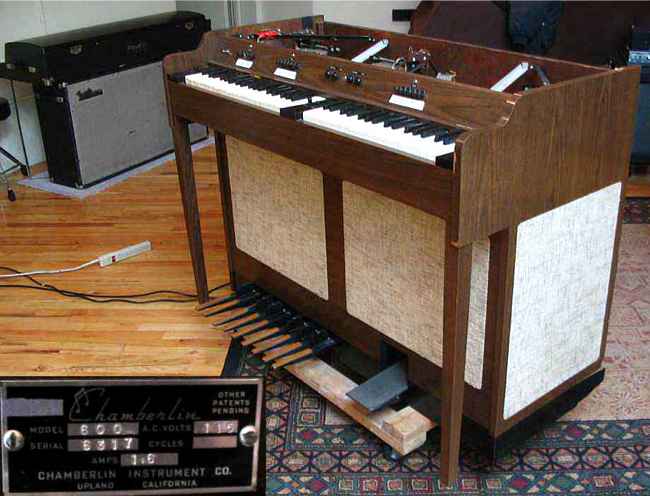
Chamberlin Music Master 600
It was a privilege to have been invited over to the Q Division
studios to view this instrument (thanks, guys!). Previously I'd only seen
pictures from an EBay auction,
but now here was the real deal.
For those who don't know, the Chamberlin Music Master was the
model for the Mellotron Mark I. The story goes that Bill Fransen brought
two Music Masters from the US to the UK where the machines were reverse
engineered to get ideas for the "Fransen" (thank goodness that name didn't
stick). After the designers in the UK were done, we had the Mellotron Mark
I.
Looking at the Chamby versus the Mark I there are distinct
similarities, but there are differences. One is less of a fire hazard than
the other for starters! But I'm getting ahead of myself. Let's take
a closer look at the Chamberlin.
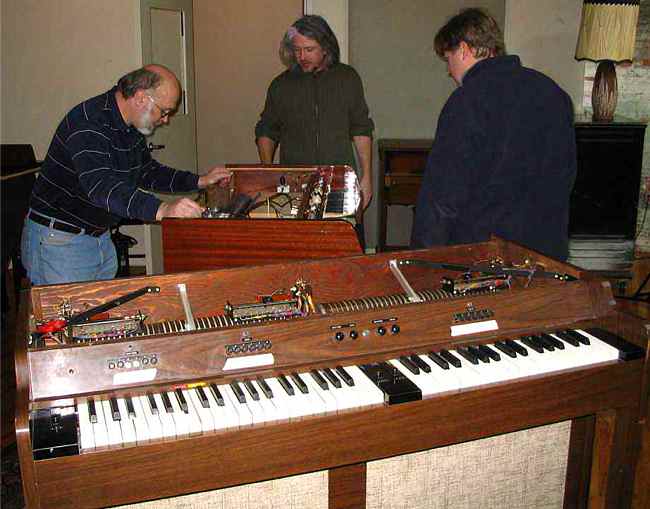
The Music Master 600 has the following features:

(click for a larger image)
| THREE cycling stations. The left
hand keyboard is split between B2 and C2 where you have rhythm and
accompaniment stations. The right hand keyboard has lead instruments.
There are 40 keys on the left side (15 rhythm, 25 accompaniment), 35 on the
right. Cycling is controlled by what works out to be a relay-driven analog
computer.
Picture 1: When you change stations, a motor and chain drive are
activated, just like the Mellotron. A bolt turns as the drum turns,
and a sleeve moves along the bolt to note what station is active. This
is similar to the sweeper dial on the Mellotron. Near the bottom of
the picture you can see a tape, but it's not a pulse tape. Instead
there's a slot cut into the tape where electrical contact is made.
Picture 2 + 3: The center (2) and right hand (3) stations are
pictured with their cycling computers. You can see the chains, too.
In the third picture you can see the tape take-up box at the top of the
picture.
Note in picture 3 that one tape is slack. The chain drive for
cycling is unreliable and skips, as the chain is not every robust and
doesn't seem to fit on the gears all that well. The result is slack
tape. The folks at Q Division cycle the machine by hand now to avoid
any problems.
What you don't see in the pictures is the mains voltage. There are
NO transformers in the machine; everything runs at 110V. This voltage
is applied liberally all over the metal in the machine. Yes, you do
feel it if you touch anything metal inside the box.
There is absolutely no way this machine would ever get a UL safety
listing. No way. |
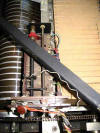
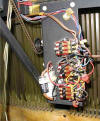
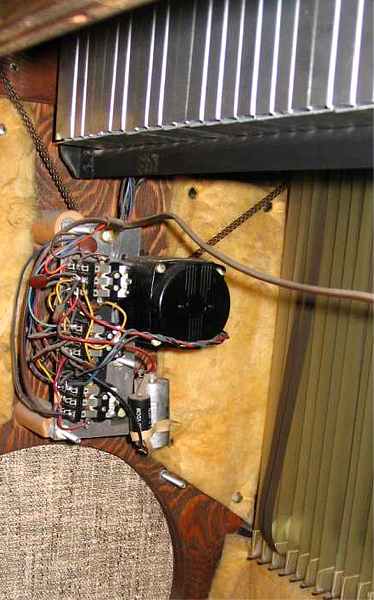 |
| Foot pedals. See the black strips
in the picture? Those are the foot pedals. Wires go from the
foot pedals up to the rhythm keys on the keyboard. If you press down a
foot pedal, the corresponding key is pressed. You can play the rhythm
keys by the keyboard or the foot pedals. |

 |
| A phonograph motor. Harry was a
wiz at putting these together with anything off the shelf. We believe
the main drive motor to be a motor from a phonograph.
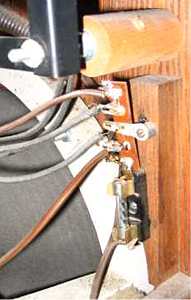
Mains voltage comes in, gets split, powers everything.
Insulators? Naaahhh, we don't need no steenkin' insulators! And,
yes, those are wire nuts. |
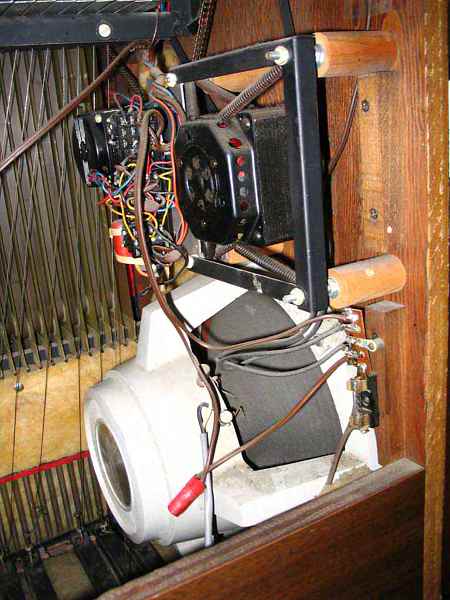 |
| A battery-powered transistor-based tape
preamp. No, not kidding. These were either harvested from
something or made very simply. Basically there are three
transistor-based amps in here with a 9V battery. Remember: there
is no transformer in the machine, and you can't exactly power tiny preamps
like this from the mains voltage. So you supply your little dry cell,
and off you go. |
 |
| Foot pedal for volume control of the
main amp and a reverb. Harry purchased an off-the-shelf home stereo
amplifier, took what he needed, attached a reverb tank, and put it into the
bottom of the machine. He added a foot pedal for a volume control.
Unfortunately the amplifier is not in the machine at this time and may be
lost. No matter, as Q Division normally runs this direct from the tape
preamp. |
 |
| 3-track, 3/8" tape. Harry's tape
path is very similar to the Mellotron's. Track select, though, is done
by a lever, and this is something Harry had in pretty much all of his
machines. You'll note the puck (pinch roller), very similar to what
you find in all Mellotrons. What is missing is the adjustment screws
for the pressure pads. Only the pinch rollers can be adjusted. And,
oh, by the way, the front control panel is bolted into the machine and the
keys are a bugger to remove (especially considering a bunch of them are tied
to the foot pedals). Pressure pad adjustment? You have to be
kidding... |
 |
|
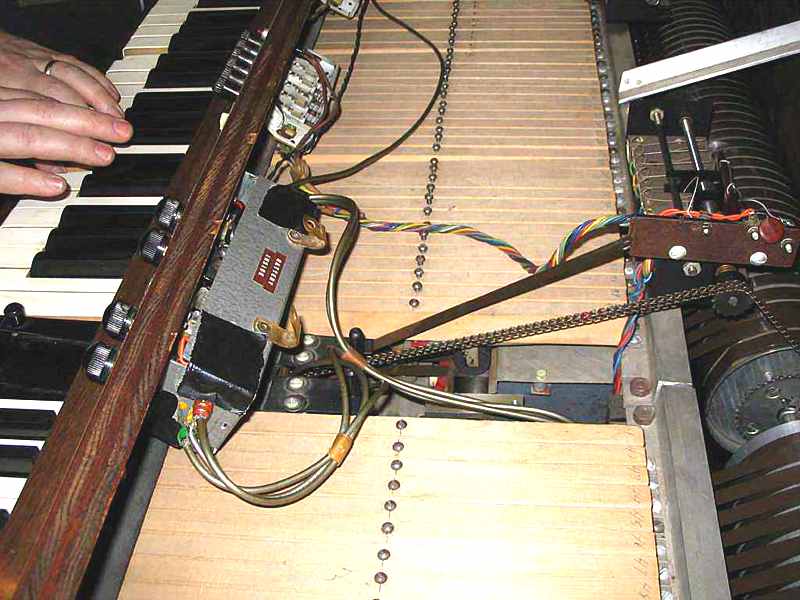 |
How do the Mellotron Mark I and Chamberlin Music Master 600
stack up? Let's find out. -->
|
